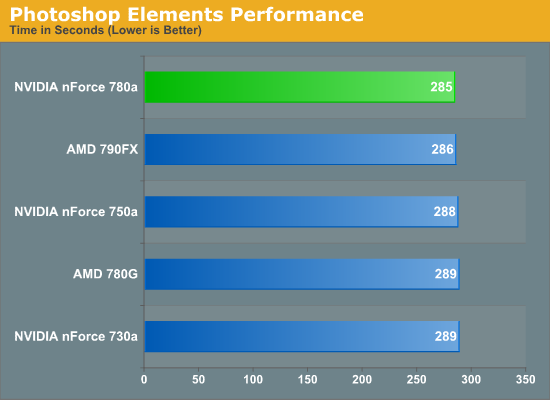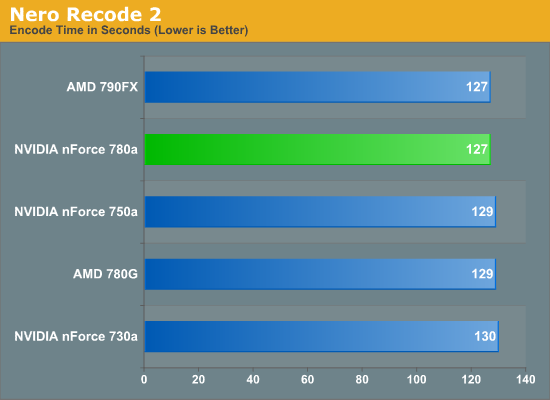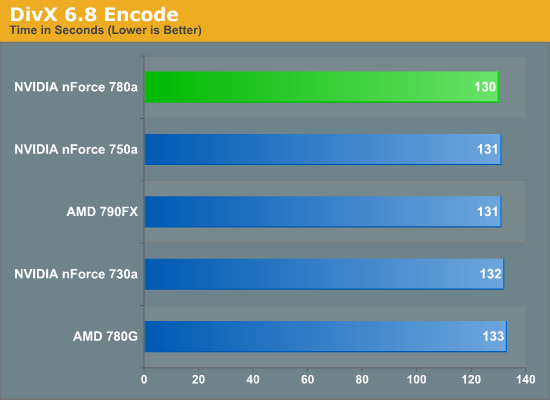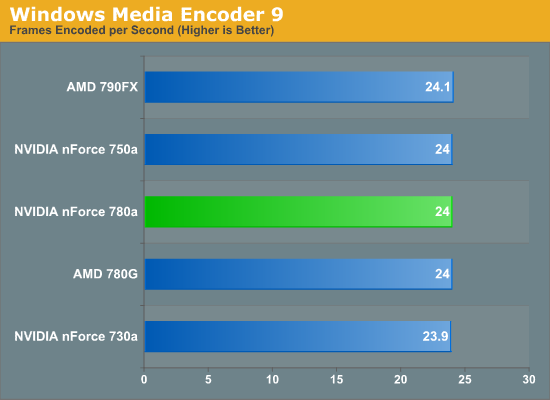NVIDIA 780a: Integrated Graphics and SLI in One
by Gary Key on May 6, 2008 12:00 AM EST- Posted in
- CPUs
Media Performance
We will take a brief look at general media performance with Adobe Photoshop Elements 6.0. Our test is one recommended by Intel, but the test itself is fair and results are very repeatable. This test simply measures the amount of time required to fix and optimize 103 different photos weighing in at 63MB. We report results in seconds, with lower times indicating better performance.

There is only a 1% difference between the chipsets with the 780a slightly edging out the 790FX in this CPU/Memory intensive benchmark. We attribute the differences to BIOS tuning although the 780G scoring measurably lower than the 790FX surprised us.
Media Encoding Performance
We are utilizing Nero Recode 2, DivX 6.8, and Windows Media Encoder x64 for our video encoding tests. The scores listed include the full encoding process represented in seconds, with lower numbers indicating better performance.
Nero Recode 2
Our first series of tests is quite easy - we take our original Office Space DVD and use AnyDVD to rip the full DVD to the hard drive without compression, thus providing an almost exact duplicate of the DVD. We then fire up Nero Recode 2, select our Office Space copy on the hard drive, and perform a shrink operation to allow the entire movie along with extras to fit on a single 4.5GB DVD disc. We leave all options on their defaults except we uncheck the advanced analysis option.

DivX 6 Converter
Our second test has us using DivX Converter to encode a 23MB AVI file into a pleasing 1080P DivX format for playback.

Windows Media Encoder x64
Our final test consists of using Windows Media Encoder's advanced video profile to encode a 128MB WMV file into one suitable for progressive download across our Web server.

Encoding Summary
Our CPU intensive encoding tests did not generate a clear-cut winner. Once again, the differences between all of the chipsets are minor at best. We recommend when purchasing a board based on these chipsets that you chose it based on features and support as the scores just do not justify another decision.










38 Comments
View All Comments
homerdog - Tuesday, May 6, 2008 - link
Don't get me wrong, HybridPower is a cool feature that I will consider when I'm making my next motherboard/GPU purchase.However, the fact remains that the HD3K cards have a significantly larger delta between their idle and load power consumption figures than the current crop of Nvidia cards. If ATI continues to build on this trend they may not even need a complex mGPU/dGPU hybrid solution to get idle consumption down to near IGP levels, although they're probably working on one anyway.
JarredWalton - Tuesday, May 6, 2008 - link
Now we just need Hybrid Power in laptops - where it should have been first, IMO! At the very least, HybridPower should have shipped with support for 8800GT/GTS 512 and 9600 cards rather than just 9800 GTX/GX2.Also, my two cents on GeForce Boost: hooray for an extra 20% over 20FPS. That sounds fine, until you look at the bigger picture. A GeForce 8400 GS or 8500 GT is terribly slow relative to most discrete GPUs. Sure, they cost $40 to $70 depending on model and features. An extra 20% performance (or even 50%) would be fine. However, a $75 8600GT is already about twice as fast and a 9600GT (with rebates available for $110-$120) isn't even on the same continent.
If you have an IGP motherboard and you think it's too slow for games, I seriously doubt you're going to want to spend $50 to roughly double the performance. As any mathematician can tell you, multiplying any real number by zero is still zero. It may not be that bad, but I'd say 9600GT with Hybrid Power support is what people should shoot for. I figure that will arrive some time in the near future. Then just wait for it to show up on Intel platforms.
FITCamaro - Tuesday, May 6, 2008 - link
While I agree with you, I think this is a great idea. An onboard GPU is always going to use less power than a discrete one. The main issue I'm concerned with is, does the system get back the memory used by the onboard GPU when the discrete GPU is in use? Granted it's only going to use 64-128MB of RAM likely, maybe 256. But still, those are resources that aren't able to be used by games.Of course it doesn't really matter for most since it only supports the 9800GTX and 9800GX2 and, in my opinion, you'd have to be stupid to go with the 9800GTX when the 8800GTS 512MB offers nearly identical performance. Heck even the 8800GT 512MB is only about 5 FPS different.
They need to offer the hybrid power support across the entire 8x00 series.
BansheeX - Tuesday, May 6, 2008 - link
Who cares about the Phenom? Where is the Intel variant, aka 730i? Another three month delay for that one? Sigh.FITCamaro - Tuesday, May 6, 2008 - link
People who want a Phenom.DigitalFreak - Wednesday, May 7, 2008 - link
Those mythical people exist?KnightProdigy - Thursday, May 8, 2008 - link
There are a lot of AMD fans. AMD still has a lot of loyal followers, maybe you forget that AMD had the speed crown for many more years than Intel. I have been an NV fan since it was STB in the early 90s, I, for one, like the fact that they are offering similar solutions, even though they lag a little.Gary Key - Tuesday, May 6, 2008 - link
We expect to see the Intel mGPU variants this summer, just in time to compete with the G45.